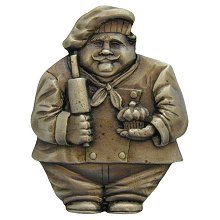The Baker
The Baker
“Take not from the mouth of labor the bread it has earned.”
Thomas Jefferson
The Worshipful Company of Bakers has a long and noble heritage going back over 800 years, I particularly enjoy their motto “Praise God For All”, which is also the traditional grace used before all meals.
As well, from a tradition based on scripture, one is encouraged to give thanks for their daily bread. Today, as through out history, the term of bread has evoked the use of monetary concepts, community, political contention and sustenance for ones family. As well it has been accorded with nursery rhyme and verse, to which many an author has ascribed a quote in one form or another.
In London the first known records of the existence of the Bakers’ Guild are contained in the great ‘Pipe Rolls’ of Henry II which listed the yearly ‘farm’ paid to the Crown and in these it is shown that the Bakers of London paid a Mark of gold to the King’s Exchequer for their Guild from 1155 AD onwards. The importance of bread and baking however goes back thousands of years before that.
A Bit of History
THE COURT OF HALIMOTE
The Bakers Guild had the very onerous responsibility of enforcing the ‘Bread Assize’ within a radius of 2 miles from the City of London or a circumference of 12 miles around, excluding the City of Westminster.
The Guild was given wide legal powers by the Court of Aldermen to administer the Assize and to order such punishments as were fitting. The Master acted as Magistrate with a jury composed of Wardens and Assistants from the Court of the Company. Only two other Companies ever received such authority - the Weavers and Fishmongers.
The Court Room of the Company’s Hall was used for these judicial purposes and the curious low balustrade across the room, at which offenders and others had to appear, is retained to this day. Another important feature of this “Court of Holy-Moot”. (Halimote), was the pair of scales, now in a glass case at the top of the stairs, for short weights was probably the most common offence. Another, not unknown in the days when coarse sandstones were used for milling, was to add extra sand to the flour, and skulls on display in London Museums show clearly how teeth were worn down as a result. Less disastrous but no less fraudulent was the addition of sawdust.
Apart from minor infringements, the penalties for more serious offences were on the first occasion for the offender to be dragged on a hurdle through the dirtiest streets of the City with the faulty loaf hanging from his neck. For the second offence he was pilloried for an hour, and if he broke the law a third time, his oven was pulled down and he had to forswear baking for evermore.
The Bakers Guild had the very onerous responsibility of enforcing the ‘Bread Assize’ within a radius of 2 miles from the City of London or a circumference of 12 miles around, excluding the City of Westminster.
The Guild was given wide legal powers by the Court of Aldermen to administer the Assize and to order such punishments as were fitting. The Master acted as Magistrate with a jury composed of Wardens and Assistants from the Court of the Company. Only two other Companies ever received such authority - the Weavers and Fishmongers.
The Court Room of the Company’s Hall was used for these judicial purposes and the curious low balustrade across the room, at which offenders and others had to appear, is retained to this day. Another important feature of this “Court of Holy-Moot”. (Halimote), was the pair of scales, now in a glass case at the top of the stairs, for short weights was probably the most common offence. Another, not unknown in the days when coarse sandstones were used for milling, was to add extra sand to the flour, and skulls on display in London Museums show clearly how teeth were worn down as a result. Less disastrous but no less fraudulent was the addition of sawdust.
Apart from minor infringements, the penalties for more serious offences were on the first occasion for the offender to be dragged on a hurdle through the dirtiest streets of the City with the faulty loaf hanging from his neck. For the second offence he was pilloried for an hour, and if he broke the law a third time, his oven was pulled down and he had to forswear baking for evermore.
The last bit of history is rather striking if you consider such application in today’s labor markets, can you imagine the dishonest mechanic slowly ‘towed’ through the streets of town for installing used parts and calling them ‘new’, or the disingenuous store clerk/cashier being taken to task for a undeserved snide remark or slothfully attending to their daily duties? Perhaps we have forgotten the worth of our daily bread and it’s importance. By chance we may be reminded yet again….
In general, bread baking, as an artisan activity is an important part of many people's lives. Whether one bakes at home or professionally is irrelevant. Many fine bakers bake at home, never open a business, and yet contribute to the artisan movement.
The BasicsIn general, bread baking, as an artisan activity is an important part of many people's lives. Whether one bakes at home or professionally is irrelevant. Many fine bakers bake at home, never open a business, and yet contribute to the artisan movement.
Bread, in one form or another, has been one of the principal forms of food for man from earliest times.
Before the manufacture and widespread availability of commercial yeast, bread bakers depended on wild airborne yeast to spontaneously ferment flour and water. When a particularly successful strain of yeast was established, bakers preserved it by setting aside a small piece of the uncooked dough. By adding this piece of old dough, called a starter, to new dough batches, bakers better controlled the fermentation process. This technique is still used to make sourdough bread. Over time the strain of yeast develops a flavor and character that is specific to a particular environment. Sourdough breads produced in different geographical regions—for example, San Francisco, California, and Paris, France—are recognized for the distinct flavors imparted by individual yeast strains.
Bread, highly nutritious food eaten in one form or another by nearly every person on earth.
Colonial Americans made bread from cornmeal at home, baking it in the fireplace hearth. Wheat for bread became available as American settlers migrated westward to the plains—regions with climates suitable for wheat farming—and established cooperative mills for grinding grain. Railroads made grain and flour distribution efficient and cost-effective. Bread makers had to make their own yeast or rely on old dough starters for leavening until 1868, when prepared packaged yeast was made available for sale to the public.
Superstitions, Economy, Tradition, Quotes and Proverbs
Last of all I would leave you with a few ‘morsels’ if you will from various societal cultures:
- Leave bread and coffee under a house to prevent ghosts from calling.
- The workers who built the pyramids of Egypt were paid in bread.
- The New Year tradition of First Footing involves leaving a piece of bread, coal and a silver coin at the front door, - to bring you warmth, comfort and enough money to last throughout the coming year.
- ‘We have learned to see in bread an instrument of community between men - the flavour of bread shared has no equal’ ~Antoine de Saint-Exupery
- Bread in one hand, a stone in the other. (German Proverb)
Of note, this verse sums up the best (in my mind) of agrarian thought:
Psalms 104:14-15
He causeth the grass to grow for the cattle, and herb for the service of man: that he may bring forth food out of the earth;And wine that maketh glad the heart of man, and oil to make his face to shine, and bread which strengtheneth man's heart.
(To be continued)



2 Comments:
I like Pslam 104 too! It does remind me of the agrarian mind, and how natural it must of seemed to use it in Israel's poetry.
Bread is fascinating to study and I must admit I wish I knew more than I do. Thanks for the informative post.
Hi Scott!
Very interesting post! And thank-you for including some of the history and philosophy connected with the art and science of bread making. It is indeed a foundation stone for our agrarian lives.
In my personal life, 'bread' or whole grains prepared in their many forms is definitely a staple part of my diet.
May the Light of Easter morning continue to shine on you brightly!
Post a Comment
<< Home